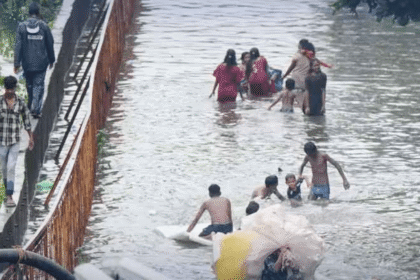As the summer sun beats down relentlessly, Pakistan finds itself in the grip of a sweltering heat wave, with most regions experiencing hot and dry weather. The Meteorological Department’s forecast offers little respite, predicting a continuation of the dry spell with only isolated showers in select areas.
The Regional Weather Divide
The country’s diverse geography has created a stark contrast in weather patterns. While major cities like Islamabad and Lahore bear the brunt of the dry heat, Karachi might experience some light drizzle, providing minimal relief from the scorching temperatures. Punjab and Balochistan are expected to remain hot and dry, with strong winds and thunder-showers potentially hitting Panjgur, Kech, Turbat, and surrounding areas.
In Khyber Pakhtunkhwa (KP), the weather is divided along geographical lines. The plains will remain dry, while upper districts like Chitral, Dir, Swat, Bajaur, Khyber, and Kurram may receive rain accompanied by thunder-showers. Gilgit-Baltistan braces for unsettled weather, with thundershowers and strong winds on the horizon. Azad Jammu and Kashmir, meanwhile, will remain dry with partly cloudy skies.
Karachi’s Weather Woes
Karachi, Pakistan’s largest city, is no exception to the heat wave. The next 24 hours will see partly cloudy skies, with temperatures fluctuating between 27.5°C and 31-33°C. Humidity levels will remain high at 78%, and winds will blow from the west at 12 km/h.
The Human Impact
The prolonged heat wave has severe consequences for Pakistan’s population. Heat-related illnesses, dehydration, and heat strokes are on the rise. The elderly, children, and those with pre-existing medical conditions are particularly vulnerable.
Agricultural Concerns
The dry spell also spells disaster for Pakistan’s agricultural sector. Crops are withering away, and the lack of rainfall threatens to exacerbate water scarcity. Farmers are struggling to maintain their livelihoods, and the country’s food security is under threat.
Mitigating Measures
To combat the heat wave, citizens are advised to take necessary precautions:
- Stay hydrated by drinking plenty of water.
- Avoid venturing out during peak sun hours (11 am – 3 pm).
- Wear lightweight, loose-fitting clothing.
- Use sunscreen and protective gear.
- Check on vulnerable neighbors and family members.
Government Response
The government has a critical role to play in addressing the heat wave’s impact. Measures such as:
- Establishing heat relief camps.
- Providing medical aid and emergency services.
- Implementing water conservation strategies.
- Supporting farmers through subsidies and irrigation programs.
Conclusion
Pakistan’s battle against the dry spell requires collective action. As the country braces for the heat wave’s prolonged impact, it’s essential to prioritize public health, agricultural sustainability, and water conservation. By working together, we can mitigate the effects of this scorching heat wave.
#HeatWavePakistan #WeatherUpdate #DrySpell #PakistanWeather #HeatSafetyTips #AgriculturalConcerns #GovernmentResponse #PublicHealth #WaterConservation







